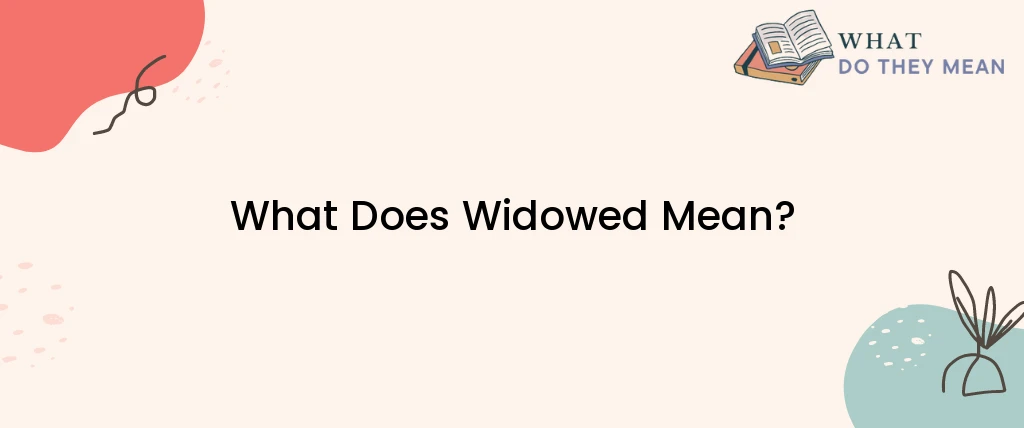The term “widowed” refers to someone who has lost their spouse and has not remarried. The loss of a partner is a deeply emotional experience that can be overwhelming for many people. The experience of being widowed can be very difficult and may involve a range of emotions, including grief, sadness, loneliness, and uncertainty about the future. In this article, we will explore what it means to be widowed and the challenges faced by those who have lost their spouse.
Defining Widowed
Being widowed means that a person’s spouse has died and they have not entered into a new marriage or civil partnership. This term is typically used to describe someone who was married or in a committed relationship at the time of their partner’s death. It is important to note that the experience of being widowed can vary widely depending on the individual’s circumstances, their relationship with their partner, and the support they have available.
Emotions and Challenges
The experience of losing a spouse can be a devastating and life-changing event that affects many aspects of a person’s life. The following are some common emotions and challenges that widowed individuals may face:
Grief and Sadness
The loss of a spouse can be a profound source of grief and sadness. Many widowed individuals may experience feelings of intense sadness, loneliness, and emptiness as they come to terms with the loss of their partner. Grief is a normal response to loss and can take time to process.
Uncertainty and Anxiety
The death of a spouse can leave a widowed individual with a sense of uncertainty about the future. Many may feel anxious about how they will cope without their partner, how they will manage their finances, or how they will adjust to being single again.
Loneliness and Isolation
Widowed individuals may feel a sense of loneliness and isolation, particularly if they were used to spending a lot of time with their partner. They may also feel disconnected from their social network, especially if many of their friends were also friends with their spouses.
Financial Strain
The death of a spouse can also create a financial strain for the surviving partner, particularly if they were financially dependent on their spouse. This can be a significant source of stress and can affect a widowed individual’s quality of life.
Identity and Purpose
The loss of a spouse can also challenge a person’s sense of identity and purpose. They may have defined themselves in part by their role as a spouse and may struggle to find meaning and purpose in their life without their partner.
Coping Strategies
While the experience of being widowed can be overwhelming, there are strategies that can help individuals cope with the challenges they face. Here are some coping strategies that widowed individuals may find helpful:
Seeking Support
One of the most important strategies for coping with the loss of a spouse is to seek support. This can take many forms, such as talking to friends or family members, joining a support group, or seeking professional counseling.
Practicing Self-Care
Taking care of oneself is essential for coping with the emotional and physical challenges of being widowed. This can include getting enough rest, eating well, and engaging in activities that bring joy and fulfillment.
Staying Connected
Staying connected with others is important for combating feelings of loneliness and isolation. This can involve reaching out to friends and family members, joining a social club or organization, or volunteering in the community.
Building a New Identity
Building a new identity after the loss of a spouse can be challenging, but it is also an opportunity for growth and self-discovery. Widowed individuals may find meaning and purpose in new hobbies, activities, or relationships.
Taking Control of Finances
Managing finances can be a significant challenge for widowed individuals, but taking control of their financial situation can help reduce stress and anxiety. Seeking advice from a financial planner or counselor can help individuals make informed decisions about their finances.
Honoring the Memory of the Deceased
Honoring the memory of the deceased can be an important part of the grieving process and can help widowed individuals find meaning and purpose. This can involve creating a memorial, participating in a charity event, or engaging in other activities that honor their partner’s memory.
Practicing Gratitude
Practicing gratitude can help widowed individuals focus on the positive aspects of their life and find meaning and purpose. This can involve keeping a gratitude journal, expressing gratitude to others, or finding ways to give back to the community.
Conclusion
The experience of being widowed can be a difficult and overwhelming process, but with the right strategies and support, it is possible to cope with the challenges that arise. Seeking support, practicing self-care, staying connected, building a new identity, taking control of finances, honoring the memory of the deceased, and practicing gratitude are all important strategies that can help widowed individuals navigate this difficult time. It is important for friends, family members, and the wider community to support and show compassion for those who have lost their spouse, as they navigate this difficult and emotional journey.

As a researcher, I am curious and driven by the pursuit of knowledge. I approach my work with a critical eye, carefully evaluating sources and methods to ensure that my findings are accurate and reliable. Whether delving into scientific studies, historical records, or cutting-edge technologies, I am always seeking to expand my understanding and make new discoveries. I am dedicated to uncovering new insights and finding solutions to complex problems, and am driven by a passion for uncovering the truth.

